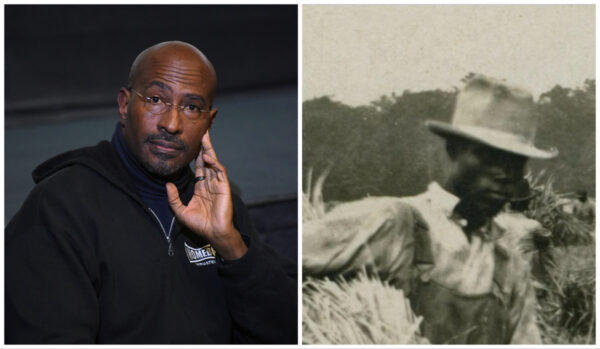Van Jones made a shocking discovery about his family history that he finds could explain why he is the person he is today.
The CNN host was blown away when he found out that his third great-grandfather beat slavery and the system.
He appeared on season nine of the PBS show “Finding Your Roots,” hosted by Henry Louis Gates Jr. The show traces the family history of its guests. Jones discovered that his third great-grandfather, Mark Kirkendall, created his own path to freedom.

Jones is a native of Jackson, Tennessee, and the father of two sons. The CNN political commentator has appeared frequently on CNN and hosted “The Van Jones Show” for the network. He also hosted an eight-part docuseries on CNN called “The Redemption Project” that followed different journeys of victims who come face-to-face with the person that committed the crime to them or their family member. In addition, he is a three-time New York Times bestselling author.
Gates showed that Jones’ third great-grandfather Mark Kirkendall was listed in the Census of Douglas Township, Arkansas, in 1850, with his wife and three children. This, according to Gates, was unusual because “almost no African-Americans were” listed by name in the federal Census during those times. They were only listed by age, color and gender. Gates informed Jones that the Kirkendall family was free 13 years before the Emancipation Proclamation.
“They didn’t need Lincoln to free them. They got free on their own,” said Jones in the episode. “Yeah, I like that.”
Kirkendall’s story, Gates said, can be traced to a will of an Arkansas farmer named Joseph Kuykendall. The will stated that if those Kuykendall held as slaves paid $800 to his sons, that person would receive freedom from slavery.
Jones’ third great-grandfather took an alternative route and killed one of Joseph’s sons, Benjamin Kuykendall. The killing was allegedly done in self-defense. Kirkendall was then arrested for murder. During the 1800s, if a Black man killed a white man or even was suspected of such a thing, he would be lynched.
Kirkendall reportedly attempted to escape from jail by cutting through the “iron” holding him by using a case knife that was provided to him by a person outside of the jail. Someone else, Jones shared during his discovery, unlocked Kirkendall’s door using keys that had been left “in plain sight,” according to Jones. He made it all the way to Louisiana before he was caught again and brought back to Arkansas to stand trial for murder.
“We just don’t know what they all went through or what they were able to achieve. What they were able to overcome or not overcome. You just don’t know,” Jones said in an emotional tone.
Luck, Gates said, was on Kirkendall’s side as the Kuykendall sons persuaded the jury to only charge Kirkendall with manslaughter. It was suspected that they wanted the lesser charge to keep him alive so they could get the $800 for Kirkendall’s freedom. He was sentenced to three years in prison.
A year later, Kirkendall received a pardon from the governor of Arkansas, a move again that was influenced by the Kuykendall brothers. After Kirkendall’s pardon, he was returned to the Kuykendall farm.
Jones was shocked and found it ironic that his third great-grandfather received a pardon. He has worked on criminal justice reform for more than 25 years. He also has helped co-found social enterprises such as Ella Baker Center for Human Rights, ColorOfChange.org, GreenForAll.org, Rebuild The Dream and the Dream Corps.
Kirkendall’s story concluded after he made his second escape from the Kuykendall family with three other slaves.
“It is the mark of what I think is inherent to being Black in America is this hope that you can beat the odds. That you know the odds are against you, but there’s some way you can beat them,” Jones said.
Jones also mentioned that fighting was always in his family blood and “it has been waiting to come out of his DNA for centuries.” He has used his political and communication degree from the University of Tennessee-Martin as well as his law degree from Yale to continue fighting for the freedom of Black people like his third great-grandfather did centuries ago.


